One of the most important philosophers and theologian of all times
G.K. Chesterton told about him: “The difficulty of dealing with St. Thomas Aquinas in this brief article is the difficulty of selecting that aspect of a many-sided mind which will best suggest its size or scale.”
I
Thomas was born between 1224 and 1225 in the castle that his wealthy noble family owned at Roccasecca near Aquino, not far from the famous Abbey of Montecassino where his parents sent him to receive the first elements of his education. A few years later he moved to Naples, the capital of the Kingdom of Sicily, where Frederick II had founded a prestigious university.
Here the thinking of the Greek philosopher Aristotle was taught without the limitations imposed elsewhere. The young Thomas was introduced to it and immediately perceived its great value. However, it was above all in those years that he spent in Naples that his Dominican vocation was born. Thomas was in fact attracted by the ideal of the Order recently founded by St Dominic.
However, when he was clothed in the Dominican habit his family opposed this decision and he was obliged to leave the convent and spend some time at home.
In 1245, by which time he had come of age, he was able to continue on the path of his response to God’s call. He was sent to Paris to study theology under the guidance of another Saint, Albert the Great, of whom I spoke not long ago. A true and deep friendship developed between Albert and Thomas.
They learned to esteem and love each other to the point that Albert even wanted his disciple to follow him to Cologne, where he had been sent by the Superiors of the Order to found a theologicalstudium. Thomas then once again came into contact with all Aristotle’s works and his Arab commentators that Albert described and explained.
In this period the culture of the Latin world was profoundly stimulated by the encounter with Aristotle’s works that had long remained unknown. They were writings on the nature of knowledge, on the natural sciences, on metaphysics, on the soul and on ethics and were full of information and intuitions that appeared valid and convincing.
All this formed an overall vision of the world that had been developed without and before Christ, and with pure reason, and seemed to impose itself on reason as “the” vision itself; accordingly seeing and knowing this philosophy had an incredible fascination for the young. Many accepted enthusiastically, indeed with a-critical enthusiasm, this enormous baggage of ancient knowledge that seemed to be able to renew culture advantageously and to open totally new horizons.
Others, however, feared that Aristotle’s pagan thought might be in opposition to the Christian faith and refused to study it. Two cultures converged: the pre-Christian culture of Aristotle with its radical rationality and the classical Christian culture. Certain circles, moreover, were led to reject Aristotle by the presentation of this philosopher which had been made by the Arab commentators.
Avicenna and Averroës. Indeed, it was they who had transmitted the Aristotelian philosophy to the Latin world. For example, these commentators had taught that human beings have no personal intelligence but that there is a single universal intelligence, a spiritual substance common to all, that works in all as “one”: hence, a depersonalization of man. Another disputable point passed on by the Arab commentators was that the world was eternal like God.
This understandably unleashed never-ending disputes in the university and clerical worlds. Aristotelian philosophy was continuing to spread even among the populace.
Thomas Aquinas, at the school of Albert the Great, did something of fundamental importance for the history of philosophy and theology, I would say for the history of culture: he made a thorough study of Aristotle and his interpreters, obtaining for himself new Latin translations of the original Greek texts.
Consequently he no longer relied solely on the Arab commentators but was able to read the original texts for himself. He commented on most of the Aristotelian opus, distinguishing between what was valid and was dubious or to be completely rejected, showing its consonance with the events of the Christian Revelation and drawing abundantly and perceptively from Aristotle’s thought in the explanation of the theological texts he was uniting.
In short, Thomas Aquinas showed that a natural harmony exists between Christian faith and reason. And this was the great achievement of Thomas who, at that time of clashes between two cultures that time when it seemed that faith would have to give in to reason showed that they go hand in hand, that insofar as reason appeared incompatible with faith it was not reason, and so what appeared to be faith was not faith, since it was in opposition to true rationality; thus he created a new synthesis which formed the culture of the centuries to come.
Because of his excellent intellectual gifts Thomas was summoned to Paris to be professor of theology on the Dominican chair. Here he began his literary production which continued until his death and has something miraculous about it: he commented on Sacred Scripture because the professor of theology was above all an interpreter of Scripture; and he commented on the writings of Aristotle, powerful systematic works, among which stands out his Summa Theologiae, treatises and discourses on various subjects.
He was assisted in the composition of his writings by several secretaries, including his confrere, Reginald of Piperno, who followed him faithfully and to whom he was bound by a sincere brotherly friendship marked by great confidence and trust. This is a characteristic of Saints: they cultivate friendship because it is one of the noblest manifestations of the human heart and has something divine about it, just as Thomas himself explained in some of the Quaestiones of his Summa Theologiae. He writes in it: “it is evident that charity is the friendship of man for God” and for “all belonging to him” (Vol. II, q. 23, a. 1).
He did not stay long or permanently in Paris. In 1259 he took part in the General Chapter of the Dominicans in Valenciennes where he was a member of a commission that established the Order’s programme of studies. Then from 1261 to 1265, Thomas was in Orvieto. Pope Urban IV, who held him in high esteem, commissioned him to compose liturgical texts for the Feast of Corpus Christi, which we are celebrating tomorrow, established subsequent to the Eucharistic miracle of Bolsena.
Thomas had an exquisitely Eucharistic soul. The most beautiful hymns that the Liturgy of the Church sings to celebrate the mystery of the Real Presence of the Body and Blood of the Lord in the Eucharist are attributed to his faith and his theological wisdom. From 1265 until 1268 Thomas lived in Rome where he probably directed a Studium, that is, a study house of his Order, and where he began writing his Summa Theologiae (cf. Jean-Pierre Torrell, Tommaso d’Aquino. L’uomo e il teologo,Casale Monf., 1994, pp. 118-184).
In 1269 Thomas was recalled to Paris for a second cycle of lectures. His students understandably were enthusiastic about his lessons. One of his former pupils declared that a vast multitude of students took Thomas’ courses, so many that the halls could barely accommodate them; and this student added, making a personal comment, that “listening to him brought him deep happiness”.
Thomas’ interpretation of Aristotle was not accepted by all, but even his adversaries in the academic field, such as Godfrey of Fontaines, for example, admitted that the teaching of Friar Thomas was superior to others for its usefulness and value and served to correct that of all the other masters. Perhaps also in order to distance him from the lively discussions that were going on, his Superiors sent him once again to Naples to be available to King Charles i who was planning to reorganize university studies.
In addition to study and teaching, Thomas also dedicated himself to preaching to the people. And the people too came willingly to hear him. I would say that it is truly a great grace when theologians are able to speak to the faithful with simplicity and fervour. The ministry of preaching, moreover, helps theology scholars themselves to have a healthy pastoral realism and enriches their research with lively incentives.
The last months of Thomas’ earthly life remain surrounded by a particular, I would say, mysterious atmosphere. In December 1273, he summoned his friend and secretary Reginald to inform him of his decision to discontinue all work because he had realized, during the celebration of Mass subsequent to a supernatural revelation, that everything he had written until then “was worthless”. This is a mysterious episode that helps us to understand not only Thomas’ personal humility, but also the fact that, however lofty and pure it may be, all we manage to think and say about the faith is infinitely exceeded by God’s greatness and beauty which will be fully revealed to us in Heaven.
A few months later, more and more absorbed in thoughtful meditation, Thomas died while on his way to Lyons to take part in the Ecumenical Council convoked by Pope Gregory X. He died in the Cistercian Abbey of Fossanova, after receiving the Viaticum with deeply devout sentiments.
The life and teaching of St Thomas Aquinas could be summed up in an episode passed down by his ancient biographers. While, as was his wont, the Saint was praying before the Crucifix in the early morning in the chapel of St Nicholas in Naples, Domenico da Caserta, the church sacristan, overheard a conversation. Thomas was anxiously asking whether what he had written on the mysteries of the Christian faith was correct.
And the Crucified One answered him: “You have spoken well of me, Thomas. What is your reward to be?”. And the answer Thomas gave him was what we too, friends and disciples of Jesus, always want to tell him: “Nothing but Yourself, Lord!” (ibid., p. 320).
II
St Thomas Aquinas is a theologian of such value that the study of his thought was explicitly recommended by the Second Vatican Council in two documents, the Decree Optatam totius on the Training of Priests, and the Declaration Gravissimum Educationis, which addresses Christian Education. Indeed, already in 1880 Pope Leo XIII, who held St Thomas in high esteem as a guide and encouraged Thomistic studies, chose to declare him Patron of Catholic Schools and Universities.
The main reason for this appreciation is not only explained by the content of his teaching but also by the method he used, especially his new synthesis and distinction between philosophy and theology. The Fathers of the Church were confronted by different philosophies of a Platonic type in which a complete vision of the world and of life was presented, including the subject of God and of religion. In comparison with these philosophies they themselves had worked out a complete vision of reality, starting with faith and using elements of Platonism to respond to the essential questions of men and women.
They called this vision, based on biblical revelation and formulated with a correct Platonism in the light of faith: “our philosophy”. The word “philosophy” was not, therefore, an expression of a purely rational system and, as such, distinct from faith but rather indicated a comprehensive vision of reality, constructed in the light of faith but used and conceived of by reason; a vision that naturally exceeded the capacities proper to reason but as such also fulfilled it. For St Thomas the encounter with the pre-Christian philosophy of Aristotle (who died in about 322 b.c.) opened up a new perspective.
Aristotelian philosophy was obviously a philosophy worked out without the knowledge of the Old and New Testaments, an explanation of the world without revelation through reason alone. And this consequent rationality was convincing. Thus the old form of the Fathers’ “our philosophy” no longer worked. The relationship between philosophy and theology, between faith and reason, needed to be rethought. A “philosophy” existed that was complete and convincing in itself, a rationality that preceded the faith, followed by “theology”, a form of thinking with the faith and in the faith.
The pressing question was this: are the world of rationality, philosophy conceived of without Christ, and the world of faith compatible? Or are they mutually exclusive? Elements that affirmed the incompatibility of these two worlds were not lacking, but St Thomas was firmly convinced of their compatibility indeed that philosophy worked out without the knowledge of Christ was awaiting, as it were, the light of Jesus to be complete. This was the great “surprise” of St Thomas that determined the path he took as a thinker. Showing this independence of philosophy and theology and, at the same time, their reciprocal relationality was the historic mission of the great teacher.
And thus it can be understood that in the 19th century, when the incompatibility of modern reason and faith was strongly declared, Pope Leo XIII pointed to St Thomas as a guide in the dialogue between them. In his theological work, St Thomas supposes and concretizes this relationality. Faith consolidates, integrates and illumines the heritage of truth that human reason acquires.
The trust with which St Thomas endows these two instruments of knowledge faith and reason may be traced back to the conviction that both stem from the one source of all truth, the divine Logos, which is active in both contexts, that of Creation and that of redemption.
Together with the agreement between reason and faith, we must recognize on the other hand that they avail themselves of different cognitive procedures. Reason receives a truth by virtue of its intrinsic evidence, mediated or unmediated; faith, on the contrary, accepts a truth on the basis of the authority of the Word of God that is revealed. St Thomas writes at the beginning of his Summa Theologiae: “We must bear in mind that there are two kinds of sciences.
There are some which proceed from a principle known by the natural light of the intelligence, such as arithmetic and geometry and the like. There are some which proceed from principles known by the light of a higher science: thus the science of perspective proceeds from principles established by geometry, and music from principles established by arithmetic. So it is that sacred doctrine is a science, because it proceeds from principles established by the light of a higher science, namely, the science of God and the blessed” (ia, q. 1, a.2).
This distinction guarantees the autonomy of both the human and the theological sciences. However, it is not equivalent to separation but, rather, implies a reciprocal and advantageous collaboration. Faith, in fact, protects reason from any temptation to distrust its own abilities, stimulates it to be open to ever broader horizons, keeps alive in it the search for foundations and, when reason itself is applied to the supernatural sphere of the relationship between God and man, faith enriches his work. According to St Thomas, for example, human reason can certainly reach the affirmation of the existence of one God, but only faith, which receives the divine Revelation, is able to draw from the mystery of the Love of the Triune God.
Moreover, it is not only faith that helps reason. Reason too, with its own means can do something important for faith, making it a threefold service which St Thomas sums up in the preface to his commentary on the De Trinitate of Boethius: “demonstrating those truths that are preambles of the faith; giving a clearer notion, by certain similitudes, of the truths of the faith; resisting those who speak against the faith, either by showing that their statements are false, or by showing that they are not necessarily true” (q. 2, a.3).
The entire history of theology is basically the exercise of this task of the mind which shows the intelligibility of faith, its articulation and inner harmony, its reasonableness and its ability to further human good. The correctness of theological reasoning and its real cognitive meaning is based on the value of theological language which, in St Thomas’ opinion, is principally an analogical language. The distance between God, the Creator, and the being of his creatures is infinite; dissimilitude is ever greater than similitude (cf. DS 806).
Nevertheless in the whole difference between Creator and creatures an analogy exists between the created being and the being of the Creator, which enables us to speak about God with human words.
St Thomas not only based the doctrine of analogy on exquisitely philosophical argumentation but also on the fact that with the Revelation God himself spoke to us and therefore authorized us to speak of him. I consider it important to recall this doctrine. In fact, it helps us get the better of certain objections of contemporary atheism which denies that religious language is provided with an objective meaning and instead maintains that it has solely a subjective or merely emotional value.
This objection derives from the fact that positivist thought is convinced that man does not know being but solely the functions of reality that can be experienced. With St Thomas and with the great philosophical tradition we are convinced that, in reality, man does not only know the functions, the object of the natural sciences, but also knows something of being itself for example, he knows the person, the You of the other, and not only the physical and biological aspect of his being.
In the light of this teaching of St Thomas theology says that however limited it may be, religious language is endowed with sense because we touch being like an arrow aimed at the reality it signifies. This fundamental agreement between human reason and Christian faith is recognized in another basic principle of Aquinas’ thought. Divine Grace does not annihilate but presupposes and perfects human nature. The latter, in fact, even after sin, is not completely corrupt but wounded and weakened.
Grace, lavished upon us by God and communicated through the Mystery of the Incarnate Word, is an absolutely free gift with which nature is healed, strengthened and assisted in pursuing the innate desire for happiness in the heart of every man and of every woman. All the faculties of the human being are purified, transformed and uplifted by divine Grace.
An important application of this relationship between nature and Grace is recognized in the moral theology of St Thomas Aquinas, which proves to be of great timeliness. At the centre of his teaching in this field, he places the new law which is the law of the Holy Spirit. With a profoundly evangelical gaze he insists on the fact that this law is the Grace of the Holy Spirit given to all who believe in Christ. The written and oral teaching of the doctrinal and moral truths transmitted by the Church is united to this Grace.
St Thomas, emphasizing the fundamental role in moral life of the action of the Holy Spirit, of Grace, from which flow the theological and moral virtues, makes us understand that all Christians can attain the lofty perspectives of the “Sermon on the Mount”, if they live an authentic relationship of faith in Christ, if they are open to the action of his Holy Spirit. However, Aquinas adds, “Although Grace is more efficacious than nature, yet nature is more essential to man, and therefore more enduring” (Summa Theologiae, Ia-IIae, q. 94, a. 6, ad 2), which is why, in the Christian moral perspective, there is a place for reason which is capable of discerning natural moral law.
Reason can recognize this by considering what it is good to do and what it is good to avoid in order to achieve that felicity which everyone has at heart, which also implies a responsibility towards others and, therefore, the search for the common good. In other words, the human, theological and moral virtues are rooted in human nature.
Divine Grace accompanies, sustains and impels ethical commitment but, according to St Thomas, all human beings, believers and non-believers alike, are called to recognize the needs of human nature expressed in natural law and to draw inspiration from it in the formulation of positive laws, namely those issued by the civil and political authorities to regulate human coexistence.
When natural law and the responsibility it entails are denied this dramatically paves the way to ethical relativism at the individual level and to totalitarianism of the State at the political level. The defence of universal human rights and the affirmation of the absolute value of the person’s dignity postulate a foundation. Does not natural law constitute this foundation, with the non-negotiable values that it indicates? Venerable John Paul II wrote in his Encyclical Evangelium Vitae words that are still very up to date:
“It is therefore urgently necessary, for the future of society and the development of a sound democracy, to rediscover those essential and innate human and moral values which flow from the very truth of the human being and express and safeguard the dignity of the person: values which no individual, no majority and no State can ever create, modify or destroy, but must only acknowledge, respect and promote” (n. 71).
Thomas presents to us a broad and confident concept of human reason: broad because it is not limited to the spaces of the so-called “empirical-scientific” reason, but open to the whole being and thus also to the fundamental and inalienable questions of human life; and confident because human reason, especially if it accepts the inspirations of Christian faith, is a promoter of a civilization that recognizes the dignity of the person, the intangibility of his rights and the cogency of his or her duties.
It is not surprising that the doctrine on the dignity of the person, fundamental for the recognition of the inviolability of human rights, developed in schools of thought that accepted the legacy of St Thomas Aquinas, who had a very lofty conception of the human creature. He defined it, with his rigorously philosophical language, as “what is most perfect to be found in all nature – that is, a subsistent individual of a rational nature” (Summa Theologiae, 1a, q. 29, a. 3).
The depth of St Thomas Aquinas’ thought let us never forget it flows from his living faith and fervent piety, which he expressed in inspired prayers such as this one in which he asks God: “Grant me, O Lord my God, a mind to know you, a heart to seek you, wisdom to find you, conduct pleasing to you, faithful perseverance in waiting for you, and a hope of finally embracing you”.
III
Even more than 700 years after his death we can learn much from him. Pope Paul VI, also said this, in a Discourse he gave at Fossanova on 14 September 1974 on the occasion of the seventh centenary of St Thomas’ death. He asked himself: “Thomas, our Teacher, what lesson can you give us?”.
And he answered with these words: “trust in the truth of Catholic religious thought, as defended, expounded and offered by him to the capacities of the human mind” (Address in honour of St Thomas Aquinas in the Basilica, 14 September 1974; L’Osservatore Romano English edition, [ore], 26 September 1974, p. 4). In Aquino moreover, on that same day, again with reference to St Thomas, Paul VI said, “all of us who are faithful sons and daughters of the Church can and must be his disciples, at least to some extent!” (Address to people in the Square at Aquino,14 September 1974; ORE, p. 5).
Let us too, therefore, learn from the teaching of St Thomas and from his masterpiece, the Summa Theologiae. It was left unfinished, yet it is a monumental work: it contains 512 questions and 2,669 articles. It consists of concentrated reasoning in which the human mind is applied to the mysteries of faith, with clarity and depth to the mysteries of faith, alternating questions with answers in which St Thomas deepens the teaching that comes from Sacred Scripture and from the Fathers of the Church, especially St Augustine.
In this reflection, in meeting the true questions of his time, that are also often our own questions, St Thomas, also by employing the method and thought of the ancient philosophers, and of Aristotle in particular, thus arrives at precise, lucid and pertinent formulations of the truths of faith in which truth is a gift of faith, shines out and becomes accessible to us, for our reflection. However, this effort of the human mind Aquinas reminds us with his own life is always illumined by prayer, by the light that comes from on high. Only those who live with God and with his mysteries can also understand what they say to us.
In the Summa of theology, St Thomas starts from the fact that God has three different ways of being and existing: God exists in himself, he is the beginning and end of all things, which is why all creatures proceed from him and depend on him: then God is present through his Grace in the life and activity of the Christian, of the saints; lastly, God is present in an altogether special way in the Person of Christ, here truly united to the man Jesus, and active in the Sacraments that derive from his work of redemption.
Therefore, the structure of this monumental work (cf. Jean-Pierre Torrell, La “Summa” di San Tommaso, Milan 2003, pp. 29-75), a quest with “a theological vision” for the fullness of God (cf. Summa Theologiae, Ia q. 1, a. 7), is divided into three parts and is illustrated by the Doctor Communis himself St Thomas with these words:
“Because the chief aim of sacred doctrine is to teach the knowledge of God, not only as he is in himself, but also as he is the beginning of things and their last end, and especially of rational creatures, as is clear from what has already been said, therefore, we shall treat: (1) Of God; (2) Of the rational creature’s advance towards God; (3) Of Christ, Who as man, is our way to God” (ibid.,I, q. 2). It is a circle: God in himself, who comes out of himself and takes us by the hand, in such a way that with Christ we return to God, we are united to God, and God will be all things to all people.
The First Part of the Summa Theologiae thus investigates God in himself, the mystery of the Trinity and of the creative activity of God. In this part we also find a profound reflection on the authentic reality of the human being, inasmuch as he has emerged from the creative hands of God as the fruit of his love. On the one hand we are dependent created beings, we do not come from ourselves; yet, on the other, we have a true autonomy so that we are not only something apparent as certain Platonic philosophers say but a reality desired by God as such and possessing an inherent value.
In the Second Part St Thomas considers man, impelled by Grace, in his aspiration to know and love God in order to be happy in time and in eternity. First of all the Author presents the theological principles of moral action, studying how, in the free choice of the human being to do good acts, reason, will and passions are integrated, to which is added the power given by God’s Grace through the virtues and the gifts of the Holy Spirit, as well as the help offered by moral law.
Hence the human being is a dynamic being who seeks himself, seeks to become himself, and, in this regard, seeks to do actions that build him up, that make him truly man; and here the moral law comes into it. Grace and reason itself, the will and the passions enter too. On this basis St Thomas describes the profile of the man who lives in accordance with the Spirit and thus becomes an image of God.
Here Aquinas pauses to study the three theological virtues faith, hope and charity followed by a critical examination of more than 50 moral virtues, organized around the four cardinal virtues prudence, justice, temperance and fortitude. He then ends with a reflection on the different vocations in the Church.
In the Third Part of the Summa, St Thomas studies the Mystery of Christ the way and the truth through which we can reach God the Father. In this section he writes almost unparalleled pages on the Mystery of Jesus’ Incarnation and Passion, adding a broad treatise on the seven sacraments, for it is in them that the Divine Word Incarnate extends the benefits of the Incarnation for our salvation, for our journey of faith towards God and eternal life. He is, as it were, materially present with the realities of creation, and thus touches us in our inmost depths.
In speaking of the sacraments, St Thomas reflects in a special way on the Mystery of the Eucharist, for which he had such great devotion, the early biographers claim, that he would lean his head against the Tabernacle, as if to feel the throbbing of Jesus’ divine and human heart. In one of his works, commenting on Scripture, St Thomas helps us to understand the excellence of the sacrament of the Eucharist, when he writes:
“Since this [the Eucharist] is the sacrament of Our Lord’s Passion, it contains in itself the Jesus Christ who suffered for us. Thus, whatever is an effect of Our Lord’s Passion is also an effect of this sacrament. For this sacrament is nothing other than the application of Our Lord’s Passion to us” (cf. Commentary on John, chapter 6, lecture 6, n. 963).
We clearly understand why St Thomas and other Saints celebrated Holy Mass shedding tears of compassion for the Lord who gave himself as a sacrifice for us, tears of joy and gratitude.
Dear brothers and sisters, at the school of the Saints, let us fall in love with this sacrament! Let us participate in Holy Mass with recollection, to obtain its spiritual fruits, let us nourish ourselves with this Body and Blood of Our Lord, to be ceaselessly fed by divine Grace! Let us willingly and frequently linger in the company of the Blessed Sacrament in heart-to-heart conversation!
All that St Thomas described with scientific rigour in his major theological works, such as, precisely, the Summa Theologiae, and the Summa contra gentiles, was also explained in his preaching, both to his students and to the faithful. In 1273, a year before he died, he preached throughout Lent in the Church of San Domenico Maggiore in Naples. The content of those sermons was gathered and preserved: they are the Opuscoli in which he explains the Apostles’ Creed, interprets the Prayer of the Our Father, explains the Ten Commandments and comments on the Hail Mary.
The content of the Doctor Angelicus’ preaching corresponds with virtually the whole structure of the Catechism of the Catholic Church. Actually, in catechesis and preaching, in a time like ours of renewed commitment to evangelization, these fundamental subjects should never be lacking: what we believe, and here is the Creed of the faith; what we pray, and here is the Our Father and the Hail Mary; and what we live, as we are taught by biblical Revelation, and here is the law of the love of God and neighbour and the Ten Commandments, as an explanation of this mandate of love.
I would like to propose some simple, essential and convincing examples of the content of St Thomas’ teaching. In his booklet on The Apostles’ Creed he explains the value of faith. Through it, he says, the soul is united to God and produces, as it were, a shot of eternal life; life receives a reliable orientation and we overcome temptations with ease. To those who object that faith is foolishness because it leads to belief in something that does not come within the experience of the senses, St Thomas gives a very articulate answer and recalls that this is an inconsistent doubt, for human intelligence is limited and cannot know everything.
Only if we were able to know all visible and invisible things perfectly would it be genuinely foolish to accept truths out of pure faith. Moreover, it is impossible to live, St Thomas observes, without trusting in the experience of others, wherever one’s own knowledge falls short. It is thus reasonable to believe in God, who reveals himself, and to the testimony of the Apostles: they were few, simple and poor, grief-stricken by the Crucifixion of their Teacher. Yet many wise, noble and rich people converted very soon after hearing their preaching. In fact this is a miraculous phenomenon of history, to which it is far from easy to give a convincing answer other than that of the Apostle’s encounter with the Risen Lord.
In commenting on the article of the Creed on the Incarnation of the divine Word St Thomas makes a few reflections. He says that the Christian faith is strengthened in considering the mystery of the Incarnation; hope is strengthened at the thought that the Son of God came among us, as one of us, to communicate his own divinity to human beings; charity is revived because there is no more obvious sign of God’s love for us than the sight of the Creator of the universe making himself a creature, one of us. Finally, in contemplating the mystery of God’s Incarnation, we feel kindled within us our desire to reach Christ in glory.
Using a simple and effective comparison, St Thomas remarks: “If the brother of a king were to be far away, he would certainly long to live beside him. Well, Christ is a brother to us; we must therefore long for his company and become of one heart with him” (Opuscoli teologico-spirituali, Rome 1976, p. 64).
In presenting the prayer of the Our Father, St Thomas shows that it is perfect in itself, since it has all five of the characteristics that a well-made prayer must possess: trusting, calm abandonment; a fitting content because, St Thomas observes, “it is quite difficult to know exactly what it is appropriate and inappropriate to ask for, since choosing among our wishes puts us in difficulty” (ibid., p. 120); and then an appropriate order of requests, the fervour of love and the sincerity of humility.
Like all the Saints, St Thomas had a great devotion to Our Lady. He described her with a wonderful title: Triclinium totius Trinitatis; triclinium, that is, a place where the Trinity finds rest since, because of the Incarnation, in no creature as in her do the three divine Persons dwell and feel delight and joy at dwelling in her soul full of Grace. Through her intercession we may obtain every help.
With a prayer that is traditionally attributed to St Thomas and that in any case reflects the elements of his profound Marian devotion we too say: “O most Blessed and sweet Virgin Mary, Mother of God… I entrust to your merciful heart… my entire life…. Obtain for me as well, O most sweet Lady, true charity with which from the depths of my heart I may love your most Holy Son, our Lord Jesus Christ, and, after him, love you above all other things… and my neighbour, in God and for God”.
Benedict XVI (General Audience 2, 16 and 23 of june)

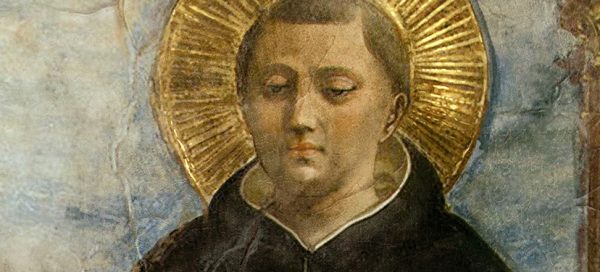

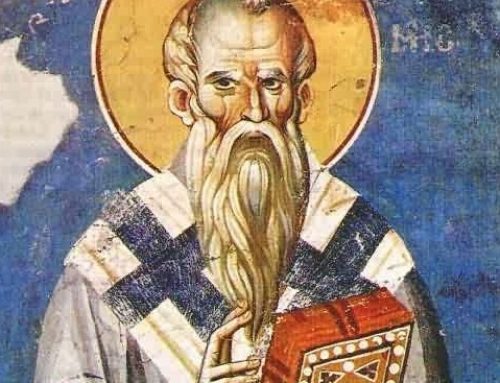
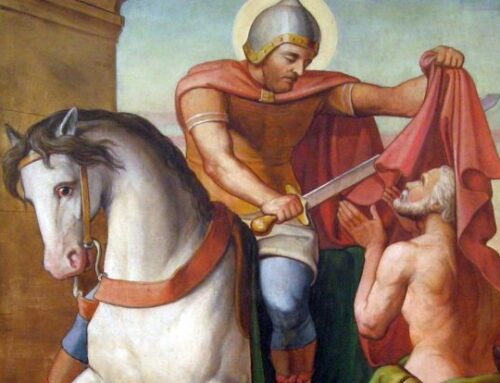
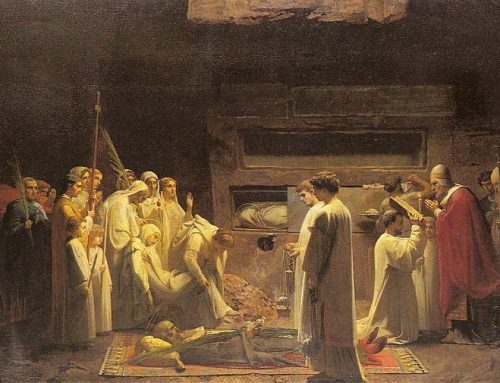
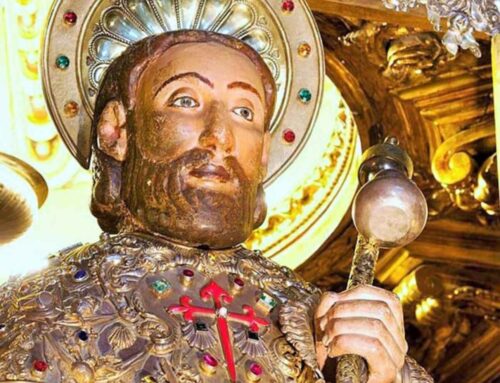
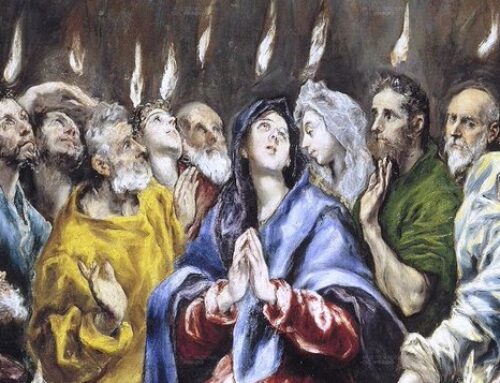
Leave A Comment
You must be logged in to post a comment.